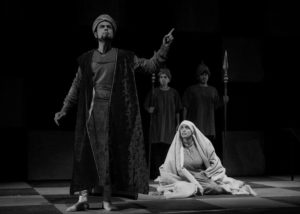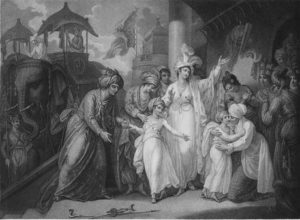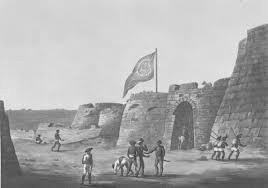This is a translation of the article by Dr S. L. Bhyrappa that appeared in a Kannada daily on September 24, 2006.
The currently sensational news in Karnataka politics happens to be centered on Education Minister Shankaramurthy who said that Tipu Sultan was an opponent of Kannada because he replaced Kannada, the administrative language of Mysore State, with Farsi. This statement has met with expected reactions from expected quarters. These quarters have also raised a din calling for the Chief Minister to sack Shankaramurthy failing which they would begin a severe agitation. The Education Minister has further clarified that he’s willing to engage in a public debate on the issue. Meanwhile, the actor, director and playwright Girish Karnad together with his associates, K.Marulasiddappa, and former Primary Education Minister, Professor B.K. Chandrashekhar called for a press conference where he has agreed for such a public debate with Shankaramurthy. This has my wholehearted support. But then, they have already passed a judgement that Shankaramurthy’s statement is dangerous and damaging to the nation. My intention is not to discuss the politics surrounding this issue. I’d like to regard Karnad as a litterateur and an artist in my response that follows.
I read his play, Tughlaq when it was first published. His craftsmanship is good. The mixture of comic—seriousness is effective. It provides immense scope for direction. It is modeled on the existential thinker-writer, Camus’ Caligula. I thought that there was a huge gap between the historical Muhammad Bin Tughlaq and the Tughlaq, whom Karnad had glorified as an ideal in his play. Back then, I neither had the interest nor the inclination to research more on the subject.
After forty years, I read Karnad’s The Dreams of Tipu Sultan. I felt that Karnad had completely whitewashed the Tipu Sultan I had read about and instead, had portrayed him as some kind of a valiant but tragic hero. I say this as someone hailing from the Old Mysore region, as someone who knows more about Tipu Sultan.
In the interim, I had also observed Girish Karnad’s statements, activities, and agitations, and had concluded that he was a committed Leftist. But those were his personal beliefs. I had therefore maintained a respectful distance giving credence to the fact that everybody has a right to their own beliefs and convictions. However, after I read The Dreams of Tipu Sultan and Tughlaq again, I decided to research in depth about these two historical characters to understand Girish Karnad’s affinity to historical truths. History has always been one of the areas of my interest. Specifically, I’ve researched Indian history to an extent.
The blurb of Tughlaq explicitly states that although the plot of the play is historical, its intent is not to portray history. However, wherever this play has been staged, both the audience and the performers have invariably felt that the Tughlaq of Karnad’s play was the real, historical Tughlaq. ‘A Brahmin was wronged by my officers. You all have seen that I am committed to erasing this injustice and that I’m devoted to walk in the path of justice. This is an unforgettable moment in the history of Our kingdom, a kingdom which is splintered due to religious strife. I want equality in my kingdom. I want progress. I want justice that is based on logic. It is not merely enough to have
peace, I want the spark of life.’ ‘The most important fact is that Daulatabad is a city where the majority is Hindus. I want to shift my capital to Daulatabad in order to foster greater harmony between Hindus and Muslims.’ Thus goes the Sultan’s words. Further, the statement that ‘the Sultan lapses into ecstasy whenever he witnesses the sight of a Brahmin who is with a Muslim friend’ is intended to evoke a feeling in the audience that Tughlaq was far more tolerant and religiously fair minded than Akbar whom he preceded by about 230 years. But then as per Ibn Battuta, this is the same Sultan who renamed Devagiri to Daulatabad. This is the same Sultan who imprisoned and forcibly converted to Islam, the 11 sons of the southern king of Kampili who rebelled against him (Ibn Battuta, The Rehla of Ibn Battuta, Eng translation by Dr. Mahdi Hussain, 1953, pg 95. Ishwari Prasad’s Qaaunah Turks in India, Vol 1, Allahabad 1936, Pg 65-66. Mahdi Hussain, Tughlaq Dynasty, Calcutta 1963, pg 207-208, quoted in “Muslim Slave System in Medieval India” by K.S. Lal, Aditya Prakashan, New Delhi, 1994). This same Tughlaq didn’t refrain from demolishing Hindu temples and building mosques on the same spot. A mosque named Bodhan Deval exists in the Nizamabad district in Andhra Pradesh. As the name itself suggests, this is a mosque built after demolishing a preexisting temple on the site. Two inscriptions—that are still available—state that this mosque was built during the reign of Muhammad Bin Tughlaq. G.Yazdani, author of Epigraphia Indo-Moslemica 1919-20, states on page 16 that “as the name itself suggests, the Deval mosque was a Jain temple, which was converted to a mosque when Muhammad Bin Tughlaq became victorious in his raid of the Deccan.” The original temple’s architecture was star-shaped. However, the Muslims (Tughlaq) replaced the sanctum sanctorum with a pulpit. This apart, the temple was not significantly modified. The original pillars remain intact till date. The carvings of the Tirthankaras on the pillars too, remain intact till date (Sitaram Goel, Hindu Temples What happened to them? Vol II, page 67).
According to Abu Nassir Aissi, Sultan Muhammad Bin Tughlaq planted the flag of Islam in corners that had never been conquered before, and had the verses of the Quran recited in places that had never heard them recited before. He put an end to the fire-worshipping verses and replaced them with the verses of the Azaan (S.A.A Rizvi, India in Tughlaq’s Time, Aligarh, 1956, Vol I, pg 325). What basis does the playwright have to depict this Sultan as tolerant, other than that of the Marxist propaganda?
Sultan Muhammad Bin Tughlaq’s exploits in slave-taking was infamous even in faraway lands. Shihabuddin Ahamad Abbas notes the Sultan’s enthusiasm in this regard as follows: “the Sultan’s ardour in waging war against Kashmir was unabated. The number of prisoners that he took was so staggering that everyday, thousands of slaves were sold at abysmal prices (Masalik-ul-abisar fi Mumalik-ul-amsar. Translated in E.D. 111 Pg 580, S.A.A Rizvi, India in Tughlaq’s Time). And it was not just in war. Tughlaq had a fancy for buying and collecting a huge number of foreign and Indian slaves. In every war or an expedition to put down rebels, the number of Kafir female-slaves that the Sultan rounded up was so huge that, as Ibn Battuta writes, “on occasion, a large number of female prisoners were rounded up in Delhi. The Nazir sent me ten of them. Of them, I returned one to the person who brought them to me. But he was not satisfied. My companion took three small girls. I don’t know what happened to the rest of them (Ibn Batutta, ibid).
What sort of an ideal do we think Sultan Muhammad Bin Tughlaq pursued?
Girish Karnad’s mind has purposefully worked in a similar fashion in The Dreams of Tipu Sultan.
During the Indian freedom struggle, wandering bards, minstrels, and those who sang lavanis used to sing rustic songs that glorified Tipu at street corners, in marketplaces, and fairs. These semi-literate and illiterate people had no knowledge of history. They were patronized by Muslims, especially Muslim merchants and businessmen who gave them bakshish. In the same vein, some playwrights wrote plays glorifying Tipu as a great patriot based on the sole fact that he had fought against the British. Thus informed, the audience and general public began to believe that this was the true picture of the historical Tipu Sultan. Post-independence, our Marxists, vote bank politicians, and religiously-driven Muslim writers, artists, playwrights, and filmmakers portrayed Tipu as a patriot and a national hero. Real history died. The British were depicted as heartless villains for taking two sons of Tipu as hostages. Girish Karnad, who adheres to this tradition of painting Tipu as a national hero takes up this hostage episode in his play and makes Tipu mouth this highly revelatory dialogue of sociology: “A new language has come to our land. A new culture. Angreji! A culture that takes children aged seven—eight as war hostages.”
However, taking war hostages was a tradition practiced by Muslim rulers who ruled India. Either Girish Karnad is ignorant of the fact that the British merely followed this existing tradition or he has deliberately suppressed it. Mir Jumla, a general under Aurangzeb defeated and looted the entire treasury of the king of Assam. And he didn’t stop there. He demanded more money and took the king’s sons and a daughter as ransom till the king brought him the money. Mir Jumla also took the sons of the king’s feudatories, Burha Go Hen, Baar Go Hen, Gad Gonia Pukhan, and Bad Patra Pukhan as war hostages. This fact is recorded by Saqi Mustad Khan in Masir-i-Alamgiri, which is Aurangzeb’s authorized biography (5th Al Hijra 1072, which corresponds to 5 January, 1663). During the Mughal rule, every Rajput king had to station at least one son in the Badshah’s court as a sign of respect. The undertone of this arrangement was clear to both parties—the son was a glorified hostage ensuring obedience from Rajput kings. This custom was inaugurated by Akbar and continued thereafter. A Rajput ruler defeated in war had to marry his daughter off to the Mughal king—a wife but nevertheless a permanent hostage. Most Rajput kings agreed to this because of their vanquished status. Maharana Pratap was the lone exception. He refused to send his son to Akbar’s court. When Khurram, who later styled himself as Shahjahan, rebelled against his own father and failed, the father Jahangir, took his son’s sons—his own grandsons—Dara and Aurangzeb as war hostages. But Cornwallis who took Tipu’s sons as hostages treated the boys with the care and propriety that befitted royal heirs, something that none of the Muslim rulers did under similar circumstances. If Muslim war hostages were non-Muslim, they were compulsorily converted to Islam.
Now, what was the condition laid down for taking Tipu’s sons as hostages? After he was defeated in the war, Tipu agreed to pay a certain sum of money to the British according to the terms of surrender. But his treasury was Image courtesy:- Google Image searchnearly empty. Neither did he have anything he could pledge until he could obtain the money. However, could the British merely believe his verbal promise? The British didn’t originally intend to take the young boys as hostages. And once throughout the time they held the boys hostages, they were treated with care and courtesy.
The fact that some politicians in their speeches, praise Tipu as the “son of Kannada” is nothing new. Kannada was the official language of the state when the Wodeyar dynasty ruled the Mysore kingdom. However, Tipu replaced it with Farsi. However, as someone who hereditarily hails from a family of village accountants that reported to the Old Mysore State’s Revenue department, I am well-versed with the tax paperwork. Thus, Farsi administrative terms like “Khata,” “Khirdi,” “Pahani,” “Khanisumari,” “Gudasta,” “Takhte,” “Tari,” “Khushki,” “Bagaaytu,” “Banjaru,” “Jamabandi,” “Ahalvalu,” “Khavand,” “Amaldaar,” and “Shirastedaar” that are still in vogue were introduced during Tipu’s time.
Tipu also changed the original names of entire cities and towns: Brahmapuri became Sultanpet, Kallikote became Farookabad, Chitradurga became Farook yab Hissar, Coorg became Zafarabad, Devanahalli became Yusufabad, Dinigul became Khaleelabad, Gutti became Faiz Hissar, Krishnagiri became Phalk-il-azam, Mysore became Nazarabad (today’s Nazarbad is the name of a locality in Mysore city), Penukonda became Fakrabad, Sankridurga became Muzaffarabad, Sira became Rustumabad, and Sakleshpur became Manjarabad.
Does all this reflect Tipu’s nationalism, his religious tolerance, and his love for the Kannada language?
Girish Karnad has taken the title of his play, “The dreams of Tipu Sultan” from a collection of leaflets written by Tipu in his own handwriting in Farsi. Major Beatson, a Britisher who edited the English edition of this collection gave it the name “The dreams of Tipu Sultan.” I have read this work.
Tipu used to be anxious about the fact that he had to have absolute privacy when he was writing this, and later, while reading it. This collection was found in the royal latrine in the Srirangapattanam palace. Tipu’s most loyal servant, Habibulla identified and confirmed that these were indeed written by his master. Today, both the original and the translation are at the India Office in London.
When one reads it, the true extent of Tipu’s religious fanaticism becomes clearer. He always refers to Hindus as Kaffirs and the British as Christians. A long-bearded Maulvi frequently appears in his dreams; Tipu goes to Mecca on a pilgrimage; Prophet Mohammad tells a long-bearded Arab, “Tell Tipu that I shall not enter Heaven without Tipu;” Tipu is then on a mission to convert all non-Muslims to Islam and Islamizes all non-Islamic nations. Tipu never talks about modernizing India and is furious that the Christians (British) are the biggest obstacles in his path; he desires to drive them out.
Tipu, who embarked on a long campaign of the Malabar and Coorg and left a brutal trail of forcible conversion of Hindus in its wake, refrained from trying a similar stunt in the Mysore region. He needed the support of Hindus after his financial humiliation in the Third Mysore War of 1791, which was when he had to submit his two sons to the British apart from surrendering a large portion of his empire. Therefore, in a move to placate Hindus, he gave a large donation to the Sringeri Shankaracharya Mutt. Our secular-progressives project this incident as an instance of Tipu’s non-sectarianism and religious tolerance.
Tipu actually wrote to the Afghan king Jaman Shah and the Caliph of Turkey to invade India and establish the rule of Islam. In his infamous sack of the Mysore palace in 1796, he rounded up the entire palace library containing invaluable ancient Hindu palm-leaf manuscripts, inscriptions, papers, and books, and ordered them to be burnt as fuel to boil gram, which was then used to feed horses.
The Muslims in the Malabar speak, read and write Malayalam even today. The same applies to Muslims in Tamil Nadu. However, Muslims in Karnataka speak only Urdu and have remained distant from mainstream Kannada. This is the direct result of Tipu’s imposition of Farsi and Urdu as the only permitted mediums of instruction.
My fundamental question concerns the freedom that a novelist can assume in depicting historical persons as characters in a work of fiction based on history. A novelist definitely has absolute freedom to portray imaginary characters according to his/her wish. This is because it is the author’s original creation. However, while portraying the character of an historical person, the author must adhere to historical truths. There are those argue that there is nothing like a universally agreed-upon historical truth, and that a historical truth depends on how a particular historian interprets it. If a litterateur is bound by an ideology or is directed by an ideological group, he/she will also be inevitably bound to portray every episode of history and every historical character according to the directions of that ideology or group.
Whatever maybe their internal denominations and categories—Communists, the J.N.U group, the Left—it is undeniable that Girish Karnad is an adherent of Marxism. One of the core beliefs of this group is that Islam has socialism while Hinduism doesn’t. In the Cold War period, Stalin, in a bid to befriend the Arab nations to act as a bulwark against Capitalist America, reemphasized how Islam is a system that provides perfect social justice. This made it impossible for Indian Marxists, who had sold their brains to Soviet Russia, to critically examine prominent historical Muslim figures of India. Added to this was their design to instigate Muslims in the garb of supporting them in a ploy to contain the BJP, which rose to prominence on the plank of pro-Hindu causes. Therefore, intellectuals like Karnad are always ready to stir up noises against the BJP. Be it an issue like the Datta Jayanti, or the Saraswati Vandana in schools, he is just waiting around the corner. With this level of ideological commitment, he will use his creativity in the service of ideology. Art then becomes a mere instrument of furthering his political beliefs. A litterateur must be politically neutral. Although it is extremely difficult, my personal belief is that if a litterateur enters politics, he/she must not let it influence his/her literature. However, Leftists claim that no art, ethics, economics, history and spirituality is bereft of a political dimension.
The purpose of my essay is not to support Shankaramurthy. Neither is it to condemn historical Muslim personalities. All Muslims in India are our brothers. Our nationalism must grow stronger on the edifice of precisely this brotherhood. However, we cannot strengthen nationalism on the foundation of a false history. Almost a century has passed since we have fearlessly written about and discussed the drawbacks of Hindu society, and initiated reforms accordingly. A society becomes stronger by such candid and honest criticism and analysis. Writing the truth about the history of Muslim rule in India doesn’t mean we are insulting Muslims. All of us need to learn lessons from history. If we are afraid to write the facts of history because it might offend people, if we bury the truth thus and build a false narrative of history, we cannot construct a strong building on such a false foundation. It is a sign of immaturity to blame the present generation for the mistakes committed by previous generations. Equally, it is as much a sign of immaturity for the present generation to equate itself with and project itself as the inheritors of previous generations.
Translated from the original Kannada by Sandeep Balakrishna.




















































Comments